Related Research Articles
The Bach-Werke-Verzeichnis is a catalogue of compositions by Johann Sebastian Bach. It was first published in 1950, edited by Wolfgang Schmieder. The catalogue's second edition appeared in 1990. An abbreviated version of that second edition, known as BWV2a, was published in 1998.
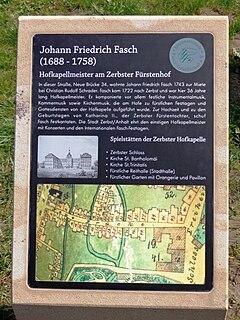
Johann Friedrich Fasch was a German violinist and composer.

Friedrich Wilhelm Zachow or Zachau was a German musician and composer of vocal and keyboard music.

Zerbst is a town in the district of Anhalt-Bitterfeld, in Saxony-Anhalt, Germany. Until an administrative reform in 2007, Zerbst was the capital of the former Anhalt-Zerbst district.
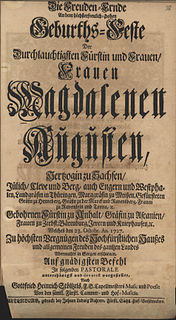
Gottfried Heinrich Stölzel was a prolific German composer of the Baroque era. Stölzel was an accomplished German stylist who wrote a good many of the poetic texts for his vocal works.
Reinhard Keiser was a German opera composer based in Hamburg. He wrote over a hundred operas. Johann Adolf Scheibe considered him an equal to Johann Kuhnau, George Frideric Handel and Georg Philipp Telemann, but his work was largely forgotten for many decades.
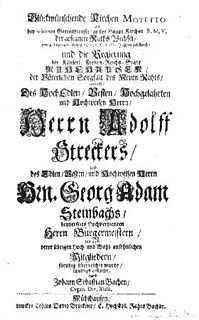
Gott ist mein König, BWV 71, is a cantata by Johann Sebastian Bach written in Mühlhausen when the composer was 22 years old. Unusually for an early cantata by Bach, the date of first performance is known: at the inauguration of a new town council on 4 February 1708.
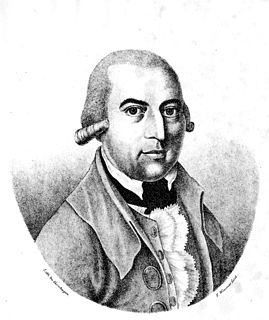
Johann Gottfried Vierling was a German organist and composer.

Erfreut euch, ihr Herzen, BWV 66.2, BWV 66, is a church cantata for Easter by Johann Sebastian Bach. He composed it for the Second Day of Easter in Leipzig and first performed it on 10 April 1724. He based it on his congratulatory cantata Der Himmel dacht auf Anhalts Ruhm und Glück, BWV 66.1, first performed in Köthen on 10 December 1718.

Denn du wirst meine Seele nicht in der Hölle lassen, JLB 21, BWV 15, is a church cantata spuriously attributed to Johann Sebastian Bach but most likely composed by Johann Ludwig Bach.
The Weimarer Passion, BWV deest, is a hypothetical Passion oratorio by Johann Sebastian Bach, thought to have possibly been performed on Good Friday 26 March 1717 at Gotha on the basis of a payment of 12 Thaler on 12 April 1717 to "Concert Meister Bachen". It is one of several such lost Passions. Both the text and music are lost, but individual movements from this work could have been reused in latter works such as the Johannes-Passion. At one time, it was thought that the work set chapters 26 and 27 of the Gospel of Matthew to music, with interspersed chorales and arias, but current consensus is that it is possible that the text reflected a synopsis of two or more Gospel texts, as well as the interspersed chorales and arias.
Johann Justus Kahle was a German organist and composer.
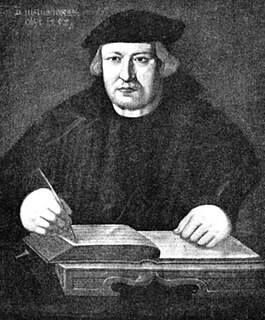
Wo Gott der Herr nicht bei uns hält, BWV 178 is a church cantata by Johann Sebastian Bach. He composed it in Leipzig for the eighth Sunday after Trinity and first performed it on 30 July 1724. It is a chorale cantata from his second annual cycle, based on the hymn "Wo Gott der Herr nicht bei uns hält" (1524) by Justus Jonas, a paraphrase of Psalm 124.
Sei Lob und Ehr dem höchsten Gut, BWV 117, is a church cantata by Johann Sebastian Bach. He composed the chorale cantata in Leipzig between 1728 and 1731 for no specific occasion, based on the hymn by Johann Jacob Schütz.
Siehe, es hat überwunden der Löwe, TWV 1:1328, BWV 219, is a church cantata by Georg Philipp Telemann, written for Michaelmas in 1723. Formerly the cantata was accredited to Johann Sebastian Bach.

Georg Melchior Hoffmann was a Baroque composer who was influential as the leader at the Collegium Musicum in Leipzig. His compositions have been mistaken for those of Johann Sebastian Bach.

"Mit Fried und Freud ich fahr dahin" is a hymn by Martin Luther, a paraphrase in German of the Nunc dimittis, the canticle of Simeon. Luther wrote the text and melody, Zahn No. 3986, in 1524 and it was first published in the same year. Originally a song for Purification, it has been used for funerals. Luther included it in 1542 in Christliche Geseng ... zum Begrebniss.
Johann Georg Röllig (1710–1790) was a German composer, organist and chapel master at Zerbst. From the age of 17, Röllig was a student at the Dresden Kreuzschule. In 1736, he matriculated at the University of Leipzig to study theology. In 1737, Prince Johann August of Anhalt-Zerbst heard Röllig perform and appointed him Court Organist and Court Musician. On the death of court Kapellmeister, Johann Friedrich Fasch, in 1758, Röllig assumed some of his duties, particularly in continuing to supply the court with cantatas. Following Hoeckh's death in 1773, Röllig was finally appointed Kapellmeister in 1774.

"Meinen Jesum laß ich nicht" is a German Lutheran hymn, with lyrics by Christian Keimann written in 1658. The theme of the hymn is trust in Jesus, based on memorial sermons for John George I, Elector of Saxony recalling conversations of the elector with his minister on his deathbed.
References
- ↑ Johann Friedrich Fasch und sein Wirken für Zerbst Konstanze Musketa, Barbara M. Reul, Internationale Fasch-Gesellschaft Zerbst. 1997 p.54 "Ganz vergessen hat Engelke den seit 1708 als Hoforganisten und Hofmusiker angestellten Johann Ulich. Ulich, der u. a. für den Musik-Unterricht der fürstlichen Familie bezahlt wurde, hatte auch maßgeblichen Einfluß bei dem Bau der neuen Orgel in der Schloßkapelle durch den Quedlinburger Orgelbauer Caspar Sperling. Von Ulich haben sich drei Solokantaten für Sopran-Solo und Cembalo, vier Sonatinen, zwei Fantasien, zwei Suiten und zwei Sonaten con Suite für Cembalo, alle handschriftlich, erhalten.* Sämtliche Werke stammen aus den Jahren 1711 ... Ihr hellen Sterne, á Soprano Solo con Clavessin, J. Ulich [Datierung] Zerbst d. Ж Maj 1711. Cantata. Hoffnung ..."
- ↑ Premiere für vergessenen Komponisten "Über Ulich selbst ist nicht sonderlich viel bekannt. Nicht mal bei seinen Lebensdaten herrscht Einigkeit. Er soll 1677 als Sohn des gleichnamigen Musikers Johann Ulich geboren worden sein. Der Vater (1634 bis 1712) war Kantor in Wittenberg, Organist und Director Musices in der Stadtkirche sowie Lehrer an der Stadtschule. Von ihm ist die Kantate "Meinen Jesus lass ich nicht" überliefert. Vom Vater erlernte der kleine Johann die musikalischen Grundlagen."
- ↑ Perhaps Ulich senior's "Kurtze Anleitung zur Singe=Kunst" (Wittenberg, 2nd - expanded - edition, 1682) grew out of his teaching activities; it also contains two hymns: "Wer nun den lieben Gott läst walten" (SSATB, Basso continuo) and "Wer seinen JESUM hält" (SATB, basso continuo). Digital copy available here.
- ↑ Landesarchiv Sachsen-Anhalt, Aussenstelle Dessau, Z92 2898, ff. 653-655
- ↑ Pfarr-Archiv St. Barth. Zerbst IV, 714, ff. 136v and 138v ("an dem ietzigen Organist H. Ulichen"); other portions were paid to the estate of his predecessor, Johann Burckhardt Meÿer. In addition to these two regular payments, the organist at the church received "Speisegeld" (money for food) twice a year, a coal allowance, and payments in kind (rye, meat and wood), and Ulich also received an additional payment in lieu of house rent. The organist was not a court employee in Zerbst, but they did receive payments in kind; the 1708/09 accounts show that both Meyer and Ulich received 20 Thaler - Ulich is even noted as "the new organist"; Landesarchiv Sachsen-Anhalt, Aussenstelle Dessau, Z92 Kammerrechnungen 1708/09, p. 62
- ↑ He was paid an honorarium of 4 Thaler for compositions in January of that year according to the court accounts ("4 [Reichsthaler] dem Organist Joh: Ulichen zum recompens wegen componirten Arien den 7. Jan[uarÿ], Nr. 1037), which he may perhaps have submitted in support of an application to work in Zerbst; Landesarchiv Sachsen-Anhalt, Aussenstelle Dessau, Z92 Kammerrechnungen 1707/08, p. 119
- ↑ Copy of the libretto at Francisceum library in Zerbst, A.11.n pp. 218-219; this is possibly why he was paid 6 Thaler "wegen unterth[änig]st übergebenen Musicalischen Sachen den 23. Julÿ 1708, Nr. 940", Landesarchiv Sachsen-Anhalt, Aussenstelle Dessau, Z92 Kammerrechnungen 1707/08, p. 124.
- ↑ For example, he supplied church pieces for Carl Wilhelm's and Sophia's birthdays in 1713 and 1714; cf. Landesarchiv Sachsen-Anhalt, Aussenstelle Dessau, Z92 Kammerrechnungen 1713/14 fol. 63v, and 1714/15 fol. 54v, where Ulich is called "HoffMusico und organist".
- ↑ Landesarchiv Sachsen-Anhalt, Aussenstelle Dessau, Z92 Kammerrechnungen 1722/23 p. 143 under "Gevatter Geschencke" (a category in the accounts listing discretionary payments by the princely family) "pro Sereniss[imo] beÿ dem Organist, Ulichen".
- ↑ Landesarchiv Sachsen-Anhalt, Aussenstelle Dessau, Z88 F13, Nr. 29, ff. 262-3.